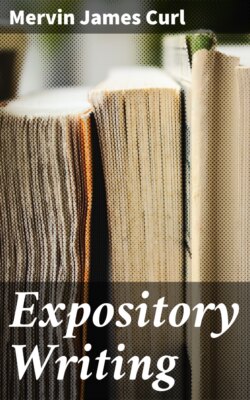Читать книгу Expository Writing - Mervin James Curl - Страница 12
На сайте Литреса книга снята с продажи.
The Controlling Purpose and the Emotional Reaction
ОглавлениеTable of Contents
So far we have been concerned with the problem of placing the facts before the reader, of appealing to his intelligence. But writing consists of vastly more than that alone. After the understanding, sometimes before, must be considered the emotions. We have the facts, we know what we think of them, and we are reasonably sure of the reader's attitude. Now we must discover how to set the reader's emotions afire in so far as we desire such an effect. In listening to a great tragedy we perceive the cold analysis of a great truth of life; but that is not all: far out beyond the bounds of understanding our emotions are profoundly stirred and we feel pity and terror. So in the account of a tremendous battle, of a fire, of anything that touches human life at all nearly and with power, our emotions are called into play. Now different pieces of writing, just like different subjects, call for different degrees of emotional reaction. Drama always rouses us, lyric poems depend upon their emotional quality, the informal essay has much emotional appeal, fiction of any sort stirs our feelings, and the more powerful the writing is, the more sure the appeal.
At first thought most expository writing might be considered to make slight appeal, if any, to emotions. That is not necessarily true; the more effective the exposition, the more real is usually the call to feeling. Often this call is subtle, usually it is subordinate to the appeal to the understanding, but in most effective expository writing it will be found. In an explanation of the Panama Canal certainly there would be roused the reader's admiration and wonder at the magnitude of the operation. The mere analysis of the facts in a criminal trial often settles the case, so great is the emotional appeal. In didactic writing the call to emotion is less strong, though such a writer as Jonathan Edwards could explain the writhing of man like a spider before the Almighty in a profoundly moving way. In axiomatic mathematical propositions we find perhaps the least strong appeal: that the sum of the angles of a triangle is equal to two right angles might seem to be divorced from all excitement. But in most exposition when emotional appeal is overlooked the writing suffers.
In an account of the American Civil War, for example, the writer might set out to show that the conflict was the culmination of the struggle between yeoman and cavalier begun long since in England. But the war meant more than that. The author will then see the emotional significance of the fight and will add to his purpose the intention to thrill the reader at the magnificent exhibition, on both sides, of devotion to an idea. So Emerson, in his essay on "Fate" in The Conduct of Life, fills the reader with gloom for page after page, detailing how thoroughly the individual is bound down by conditions of birth, sex, breeding, wealth—and then in two wonderful sentences he turns the whole course of thought and emotion by saying, "Intellect annuls fate. So far as a man thinks, he is free," and the reader is stirred as with a trumpet call to renewed courage, which, to use Emerson's words, "neither brandy, nor nectar, nor sulphuric ether, nor hell-fire, nor ichor, nor poetry, nor genius" can overcome. And the historian Greene, in his well-known account of Queen Elizabeth, states his controlling purpose in the words, "Elizabeth was at once the daughter of Henry and of Anne Boleyn." But these words are not the whole of his purpose; he intends, besides the intellectual grasping of the Queen's character, an intense admiration and wonder at the resourcefulness, the shrewd judgment, and a reaction of amusement to the strange outbreaks of unwomanly freaks or of feminine wiles.
The controlling purpose, then, is almost always of a dual nature; it aims at both the understanding and the emotions. Whenever there is any real possibility of making it thus double the writer should so express it to himself.
In the following magazine article such a double purpose obviously exists. First of all there are the facts of the marching of American troops through London. These facts are unchangeable. Baldly stated, the significance of the fact is that the New World is coming to the help of the Old World against the monster of unrestrained militarism. To a person who regards life coldly, as the mere interplay of calculable forces, one whose emotions are not concerned, this would be a sufficient statement of the whole truth, of the total significance. But such writing would miss the chance of power, would be forever less valuable than it ought to be, for a great warming of the heart answers those footfalls in London streets. In other words, just as we have seen that there are two kinds of exposition—mere noting of facts and interpreting of facts—so we now see that interpretation can be either lifeless, or moving, charged with power. It is the old difference between the drama and a sermon: the play thrills and the sermon convinces. Either may add the other quality—a fine drama or a well-made sermon does. In this account of American soldiers in London the truth is made clear, but far more than that it is made alive, pulsating with emotion of national pride, of racial solidarity, of high moral purpose. In so far as the writer succeeds in stirring us, in just so far he is more likely to make the truth take hold upon us and bind us firmly in its grasp. It is the writing that both convinces and moves us that is lasting, that is really powerful.
